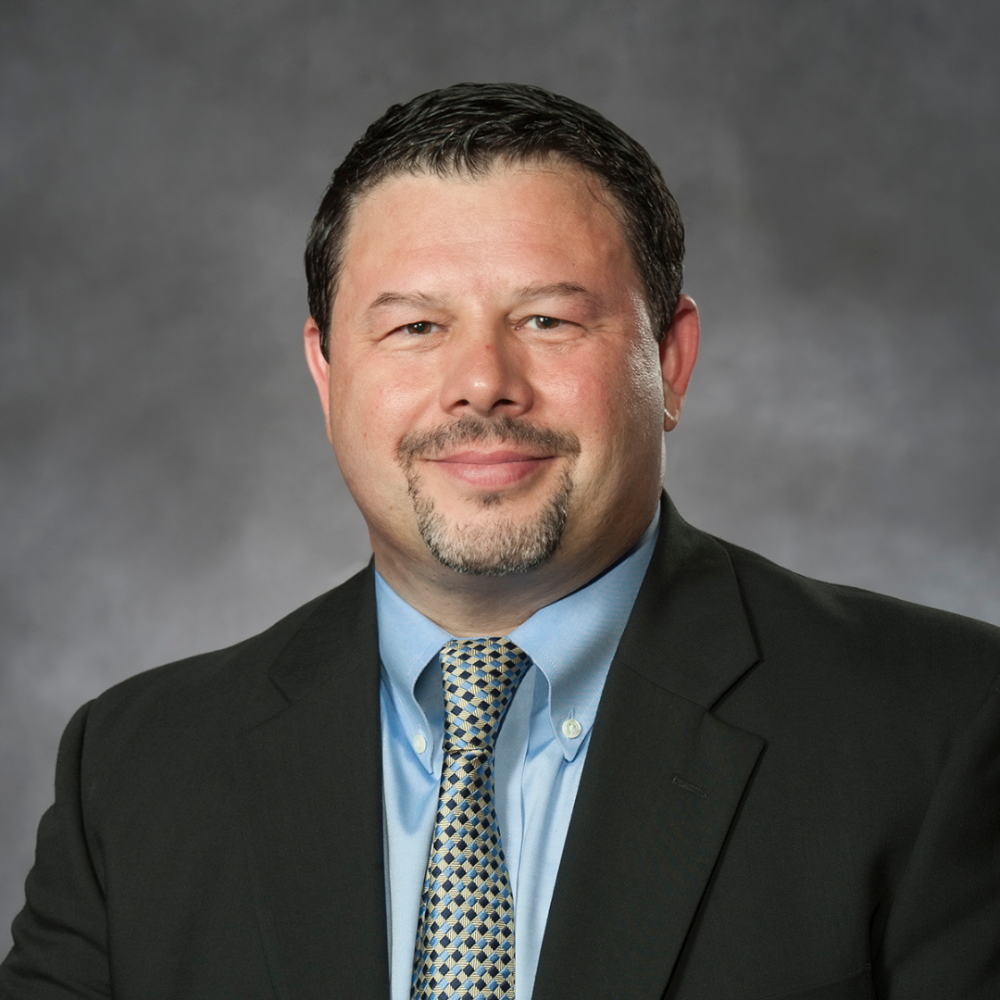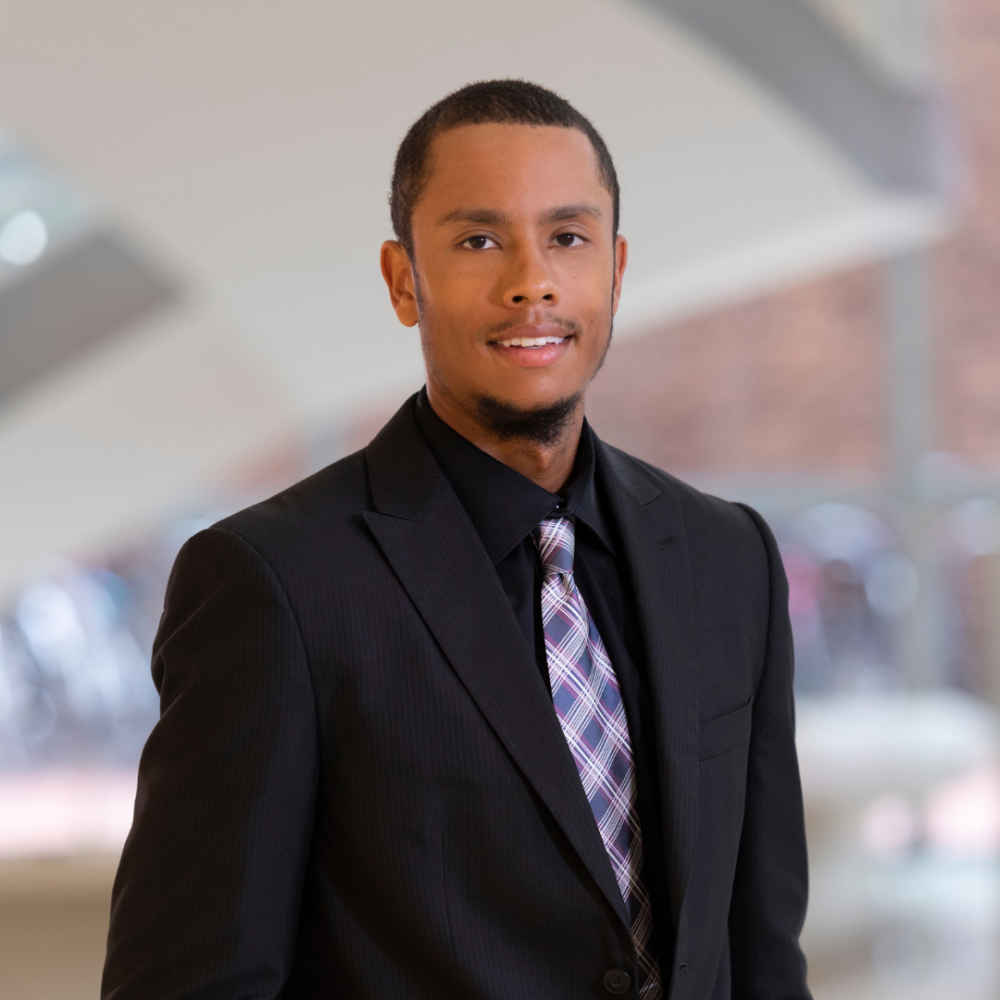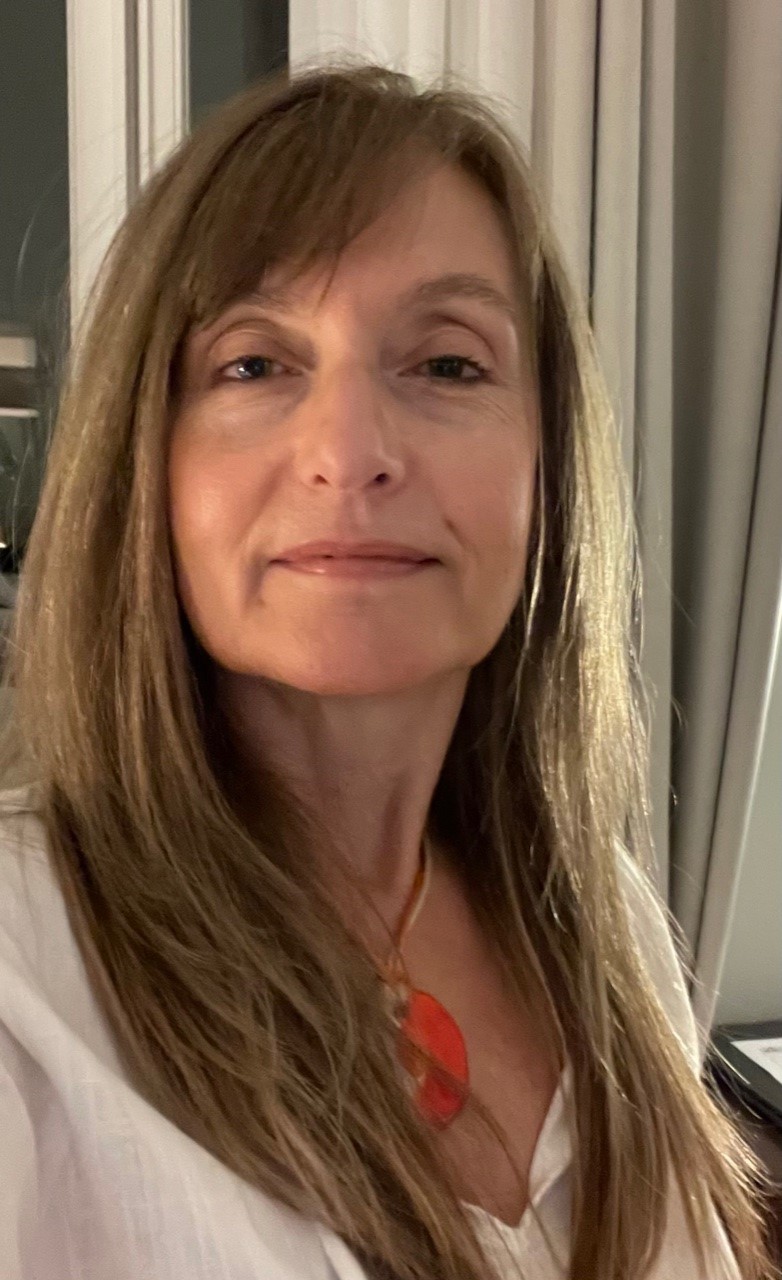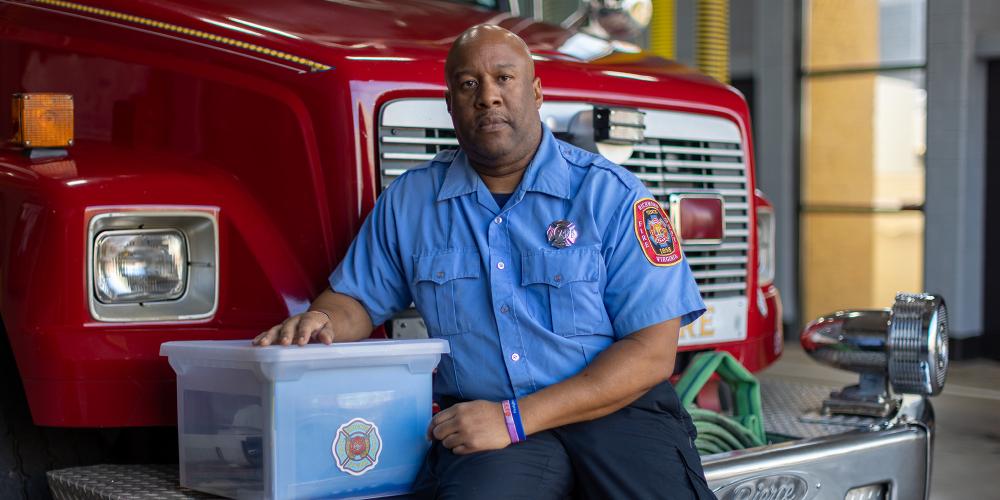Massey Expands Effort to Research Firefighter Cancer Prevention Risks

Jonathan Clarke, a 19-year veteran firefighter for the City of Richmond, learned last May he had leukemia, a blood cancer caused by a rise in the number of white blood cells. Photo: Tyler Trumbo, MCV Foundation
Jonathan Clarke’s 19-year career as a Richmond City firefighter started with a bang.
He was still in training in March 2004 when a catastrophic blaze engulfed Virginia Commonwealth University dorms under construction along W. Broad Street in downtown Richmond. Billowing black smoke filled the sky over the city as hot embers jumped across the street, causing more fires to break out in buildings near the VCU School of the Arts, effectively shutting down numerous city blocks for hours as firefighters worked to gain control.
It was the biggest fire of Clarke’s career.
Yet, despite the danger he faced then, the experience will never compare to the spring-like day last May, when Clarke, 52, arrived at a clinic for what he thought was routine, follow-up bloodwork and instead found out he had leukemia.
Four-alarm fires are scary.
Cancer is terrifying.
“That changes you as an individual,” Clarke explained quietly. He eyes welled with tears. He was sitting at a restaurant table in mid-December as holiday music played overhead, seven months after hearing the worst news of his life.
According to the Centers for Disease Control and Prevention’s National Institute for Occupational Safety and Health, firefighters have a 9% greater chance of developing cancer than the general population, and a 14% higher mortality rate.
Most research into the connection between firefighters and cancer has historically focused on occupational exposure to carcinogens encountered while fighting fires – asbestos, diesel exhaust and fire suppression chemicals – or more recently, the cancer-causing toxins found in chemicals released from the protective fire-retardant equipment they wear.
Those occupational hazards remain at the forefront of industry safety concerns.
To expand upon this, VCU Massey Cancer Center, in partnership with Richmond Fire and Emergency Services and the Virginia chapter of the Firefighter Cancer Support Network, are working together to gather data on a range of occupational and lifestyle risk factors experienced by Virginia firefighters to better understand ways to prevent and mitigate cancer in the force.
We know that if cancer is caught early, survivorship is much more likely.
Steve Weissman, director of the Virginia chapter of the Firefighter Cancer Support Network
These efforts, which mirror those nationally, have led Massey and its local partners to develop a cohort called the Virginia Firefighters for Lifelong Health registry. The registry launches Feb. 23, to coincide with the 2023 Virginia Fire Chiefs Association’s Virginia Fire & Rescue Conference in Virginia Beach. Attendees will be able to sign up and complete an online survey through the registry website or download an official smartphone app, where the survey can also be completed. The digital infrastructure is being developed by Northern Virginia-based Vibrent Health, a tech team that’s also highly invested in the study’s success.
The survey could unlock crucial data for the future of cancer prevention and treatment for firefighters.
The survey will be open to all current and retired Virginia firefighters, salaried and volunteer, and at any stage of health, including people who have been diagnosed with cancer and those who have not.
The data will be collected confidentially using methods to safely secure information that will be part of larger research efforts to create effective, tailored interventions and educational programming for firefighters that ultimately save lives. In addition to the survey, the registry website and app will feature information about links between cancer and firefighters, research documents and nutrition guides.
Clarke, who currently works at the city’s station 8 and whom colleagues jokingly refer to as the “Mayor of Church Hill,” recalled that May afternoon when he learned of his diagnosis.
“I probably cried for 20 minutes,” he said. He remembers thinking the worst, that “I’m going to die next week.”
As he spoke, he fidgeted with colorful bands he wore on his wrist. He would later explain their significance – orange signified leukemia, blue for the Firefighter Cancer Survivor Network and purple for lupus, a different blood disease but one that affects one of his relatives.
A black one honors a firefighting colleague who died of cancer.
“It changes your life, and it changes your family’s life,” Clarke said. Those family conversations hit the hardest.
“You have to tell your family you’re sick and even though no one knows when you’re going to go,” he said, “you start thinking about the planning, like what would my family do if I go tomorrow.”
A Partnership with Massey

The partnership between Massey, Richmond Fire and Emergency Services and the Firefighter Cancer Survivor Network began in 2019 after members of Richmond’s fire department and the network approached Massey with concerns.
More firefighters were being diagnosed with more types of cancer, and alarmingly, at younger ages.
“It’s a life and death issue for them – they’re concerned about their brothers and sisters in the firefighter work force,” said Bernard Fuemmeler, Ph.D., a behavioral scientist, and associate director for population science at Massey Cancer Center.
From those early conversations, Dr. Fuemmeler gathered a dream team of cancer prevention and control scientists. It includes Jim Burch, Ph.D., professor, and occupational epidemiologist, and Chrisa Arcan, Ph.D., a nutritional epidemiologist and associate professor, as well as Hua Zhao, Ph.D., a cancer epidemiologist, and Theresa Swift-Scanlan, Ph.D., RN, a bio-behavioral scientist.
Fuemmeler also enlisted the help of Trevin Glasgow, Ph.D., a VCU School of Medicine post-doctoral research fellow and an industrial organizational psychologist.
Collectively, the team realized immediately they needed to gather more data.
“We don’t know enough about cancer risk factors and cancer rates among our Virginia firefighters,” Dr. Fuemmeler said, so to get a starting point for data collection, Massey developed a survey throughout 2021 that was filled out by 172 Richmond City firefighters in 2022.
The survey focused on identifying effective ways to prevent cancer, including lifestyle behaviors – sleep, nutrition, exercise, smoking and alcohol consumption – as well as attitudes toward cancer and their jobs.

Dr. Glasgow, who studies the health of employees in the workplace, said that the initial survey offered results that underscore the impact of lifestyle habits.
One of the biggest issues plaguing firefighters is sleep. According to Massey’s survey, sleep was the top issue reported by firefighters when asked about issues the profession needs to address. Respondents reported an average of six hours of sleep – less than the nationally recommended average of seven – and only 3.5% of respondents described their sleep as “very good.”
Nearly 25% reported having been diagnosed with sleep disorders by a doctor or health professional.
Mental health followed sleep as a priority. About 80% of respondents reported it was at least “slightly difficult” to keep up enough enthusiasm to get things done, while more than half reported that COVID-19 increased their stress levels “a great deal” or “somewhat.”
Fewer than half of respondents met the physical activity guidelines of at least 150 minutes of moderate physical exercise per week, lower than national averages.
When it came to their beliefs about cancer, 35% were worried “a lot” about getting cancer, while just over half were worried “a little.” Most agreed with a survey statement that read: “It seems like everything causes cancer.”
So, what do sleep, stress or poor nutrition have to do with cancer?

“All of these factors have some impact on cancer,” said Dr. Arcan, who’s background includes studies on dietary intake and behavioral change strategies, and whose previous research includes nutrition interventions to improve eating behaviors, reduce inflammation and prevent chronic disease for first responders to the World Trade Center attack.
Along with all the environmental factors, she said, firefighters face just as many lifestyle risks as the general population when it comes to their health.
“We know toxins cause cancer,” she said, but their research could determine “if diet and healthy lifestyles moderate the association between toxin exposure and cancer development.”
Dr. Glasgow echoed Dr. Arcan, saying that unhealthy daily habits can trigger bigger issues like inflammation, and diseases like diabetes or heart disease, and all of those raise one’s risks of cancer.
“We need firefighters but unfortunately, it’s a dangerous profession, not just because of what can happen at a fire, but what can also happen outside of the firefighting environment,” Dr. Glasgow said. “The lifestyle behaviors you engage in, that could be a result of your job and the stress that your job imposes on you, certainly can have long-term negative effects.”
One positive outlook from the survey: most respondents were getting screened for specific cancers. Among the respondents, 79% reported being screened for colon cancer, and 77% of men ages 50 and older reported getting screened for prostate cancer. Accordingly, 100% of female firefighters reported being screened for breast and cervical cancers.
For cancers such as skin or lung, fewer respondents sought screenings: 35% and 39% respectively.
Dr. Glasgow said the survey is intended to be a starting point for what Massey researchers hope will be a long-term look at firefighters and cancer prevention, as many cancers can take years to develop. He said there is also the potential to study subsets of respondents, to take deeper dives into specific groups that may present with similar symptoms.
As long as I’m healthy, I can help somebody else.
Jonathan Clarke
To do that, Massey researchers are hoping that participation is strong, and that individuals are willing to offer additional health information as biomarkers for areas like bloodwork, inflammation, and other health data points.
The goal is to get a better overall sense of how to help firefighters, said Dr. Burch, particularly through educational opportunities that drive home healthy habits.

“Firefighters have high cancer rates, and we need to do something about it,” Dr. Burch said.
“We’re going to help get the data, so we understand the risk factors, and then how to get the biggest bang for our buck when it comes to prevention,” he said. That could be educational programming that provides for more screenings, or behavioral changes that allow for more sleep, or advocating for more protective gear – or maybe all those things at the same time.
“We need to do things in the community to help them not only with cancer prevention, but if they’re diagnosed, how to give them the best care possible,” Dr. Burch said, while also helping them with issues like post-traumatic stress disorder, sleep disorders and more.
“If we do that,” he said, “we’ll be preventing cancer.”
The statewide registry will serve as a catalyst for future research , as well as a resource for informing legislation that pertains to firefighters and workers compensation under Virginia’s presumption disability laws.
In short, the laws identify disabilities covered under worker’s compensation. Currently, there are 10 cancers covered for firefighters, which applies to both salary employees and volunteers: pancreatic, prostate, ovarian, breast, colon, testicular, brain, throat, colorectal and leukemia.
But if there are increasing cases of other types of cancers diagnosed for firefighters that are not included under state laws, the data will be able to help firefighting organizations and advocates lobby for those additions to be made as well as the resources needed to prevent or treat them.
Fundraising is ongoing, Dr. Fuemmeler said, noting that money has been raised to create the app and launch the registry, but much more is needed to support ongoing research.
“This project is so rewarding and so meaningful and to be part of it is really an honor,” he said. “We want to do some good science at Massey, but it means so much more when we do science that does some good.”
Working Toward Healthy Outcomes


There are about 20,000 career and volunteer firefighters across Virginia, plus countless others who have already retired after years of dedicated service.
Steve Weissman, a retired firefighter, a cancer survivor and now director of the Virginia chapter of the Firefighter Cancer Support Network, is working with more than 50 firefighters who have been diagnosed with cancer and have reached out for help. His organization offers a variety of resources, from no-cost awareness training for fire departments, to mentorship relationships for those who have been diagnosed with cancer and help finding them the best care after a diagnosis, including at Massey.
Firefighters have high cancer rates, and we need to do something about it.
Jim Burch, Ph.D.
He knows, however, there are likely many more. Of those he is working with, 10 have thyroid cancer – a new cancer showing up with more frequency in firefighters.
“We did not realize the scope of the problem in Virginia,” Weissman said. “We know firefighters are being diagnosed, but we don’t know how many or with what types of cancer.”
The registry survey on the app will ask participants a series of questions on everything from sleeping, eating and exercise habits to beliefs and feelings about cancer, mental health, job stress levels and more.
Weissman said he is hoping many firefighters take advantage of the information available to them and participate, for the sake of themselves, but also their firefighting brothers and sisters.
“We know that if cancer is caught early, survivorship is much more likely,” Weissman said. “The last thing you want to hear a physician say is ‘We could have avoided this.’”
Clarke is monitoring his blood regularly and for now, has not started a treatment plan.
He’s thankful his primary care doctor noticed the irregular bloodwork during one of his annual check-ups last year and encouraged him to do more tests. Clarke has become a mentor within the support network.
“As long as I’m healthy, I can help somebody else,” he said.
When asked if he’d change anything about the last 19 years, Clarke was quick to answer.
“I wouldn’t change a thing,” he said. “I’d still choose to go out and help people. When that bell goes off in the firehouse, that’s somebody’s bad day but I still want to go out and help as best I can.”
If you wish to support this effort at VCU Massey Cancer Center, give online or contact Jasmine Davis, Massey’s interim senior director of development, at 804-484-4903 or jjdavis3@vcu.edu.
Join the Effort
Support Massey’s work to help prevent and treat cancer.